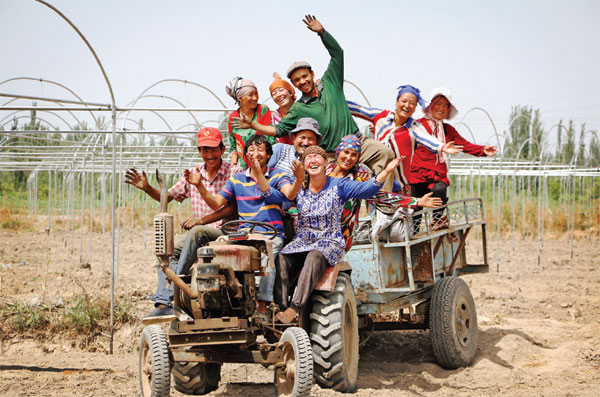Farmers reap new benefits with Rural Taobao
E-commerce helps them save money as well as gain access to products once difficult to buy
Farmers in a village in eastern China's Jiangxi province place more than 800 orders each month for items of daily use, appliances and agricultural tools from places all around China, with the help of one couple.
Zhong Hua and his wife have been working in the 20-square-meter service center in the village of Xiecun since September 2015, when Alibaba, China's biggest online shopping website, started Rural Taobao in villages in Ruijin, Jiangxi.
|
Farmers in Bachu, Xinjiang Uygur autonomous region, after work. They are benefiting from Rural Taobao, which builds a bridge for agricultural products between urban and rural areas. Provided to China Daily |
"Farmers can not only save money, but also reach out for stuff they couldn't get easily, as well as enjoy the convenience brought by logistics," says Zhong, a Rural Taobao assistant in his 30s.
Zhong cited the example of a washing machine, which previously would cost villagers nearly 3,000 yuan ($454; 383 euros; £338) and require them to make an hourslong trip by bus to a store in the nearest city. But now, they can find one of the same quality for no more than 2,000 yuan on Rural Taobao.
"A difference of hundreds can be significant for farmers," says Zhong.
He applied to become a Taobao assistant when he saw the recruitment notice, realizing the importance of the internet to farmers, especially the power of an online shopping website when promoting and selling agricultural products.
He says he gets a small portion of the value of the orders that he helps villagers with, earning more than 4,000 yuan each month.
"When the service center first opened in Xiecun, villagers laughed and some even predicted that it wouldn't last for more than one month," Zhong says, adding that farmers initially believed that goods purchased online were mostly fake and couldn't be trust-ed. "But now, their knowledge on that has grown rapidly."
Zhong tells a typical story of a man in his 70s whose son bought a cellphone on Rural Taobao from Zhong. "He comes to our service site together with his grandson often, as he doesn't have Wi-Fi at his home, talking to his son who is working in Dongguan, Guangdong province, on video calls."
Nearly 60,000 Taobao assistants such as Zhong are working in nearly 30,000 villages around China, helping millions of farmers not only get to know more about purchasing online, but also sending their products to hundreds of millions of buyers from cities, according to Li Tianyu, a project manager of Rural Taobao.
"We are not pushing to send people to the countryside. Instead, we pour energy into the rural market, attracting talent to the villages themselves," Li says.
It's part of a project to promote the rural service of Alibaba Group, the Chinese e-commerce, retail and technology conglomerate. Cooperating with local governments and based on internet infrastructure, Rural Taobao, a branch of Alibaba, is building the bridge for products and information between urban and rural areas, taking industrial products to the countryside from the cities, and providing agricultural products from rural areas to cities.
In addition to training Taobao assistants in villages, measures taken include building logistics branches in rural areas, promoting agricultural products on the front pages of online shopping websites, providing unsecured loans for farmers to improve production, and analyzing big data to give feedback to farmers on how to boost production, Li says.
Wang Wei, a project manager at the agricultural development department of Rural Taobao, says specialty fruits such as dragon fruit in Hainan province, passion fruit and kiwi in Fujian province, navel oranges in Chongqing and peaches in Zhejiang and Hebei provinces have found their way onto Rural Taobao.
The platform made it possible for nearly 1 million kilograms of apples from Aksu prefecture in the Xinjiang Uygur autonomous region to be sold in half a day through Rural Taobao.
Liu Jingwen, also in his 30s, operates the popular online store Vizdan, which opened a special page on Rural Taobao last year.
Liu joined a Xinjiang aid project seven years ago and ended up helping to sell fruits and nuts grown by local farmers. From walnuts to dates and apples to melons, Vizdan offers more than 20 kinds of agricultural products from the Xinjiang region and receives tens of thousands of orders monthly.
Liu saw how Aksu apples became known and welcomed around the country in recent years, since Aksu prefecture, located near the Taklamakan Desert, has little rainfall but much sun, which contributes to the high sugar content of the apples.
"The farmers, however, didn't have access to more buyers. Nor did they have technical support to upgrade the products. They don't speak Mandarin, and some of them still don't use cellphones," Liu says, adding that the villagers used to earn less than 3,000 yuan per household per year, which is below the poverty line.
In 2017, Vizdan signed contracts with 115 Aksu apple farmer families, selling their apples on Taobao - which doubles the farmers' annual income - and providing technical support that improves the quality of the fruit, Liu says.
Tunyas Nimat, who is 72, began planting apple trees in 2005 and has an apple farm of 0.87 hectares. "My whole family's income relies on the apple trees. I raised the trees, and now they feed me," Nimat says.
Villagers in 29 provinces around China sold more than 20 kinds of agricultural products on Rural Taobao for 450 million yuan on Singles Day on Nov 11 - up from nearly zero three years ago, says Li Tianyu, the Rural Taobao project manager.
"Farmers usually plant their own crops. They don't know how to promote their special products or pay attention to the quality of the products, not to mention branding," Li says.
A team from Rural Taobao went to a rice-producing area in Heilongjiang province, where farmers used to apply pesticides on a large scale and sell the rice without nice packaging.
"Wuchang is known for its loamy soil, abundant water and suitable weather for rice planting, which contribute to the rice's soft and sticky feel and pleasant smell. But the locals didn't notice the advantage and the price used to be 6 yuan per kilogram," says Li. But Wuchang rice is now one of the most popular types on Taobao, and the price has reached 30 yuan per kilogram, Li adds.
Contact the writers at suqiang@chinadaily.com.cn and yandongjie@chinadaily.com.cn
(China Daily European Weekly 01/19/2018 page7)



















